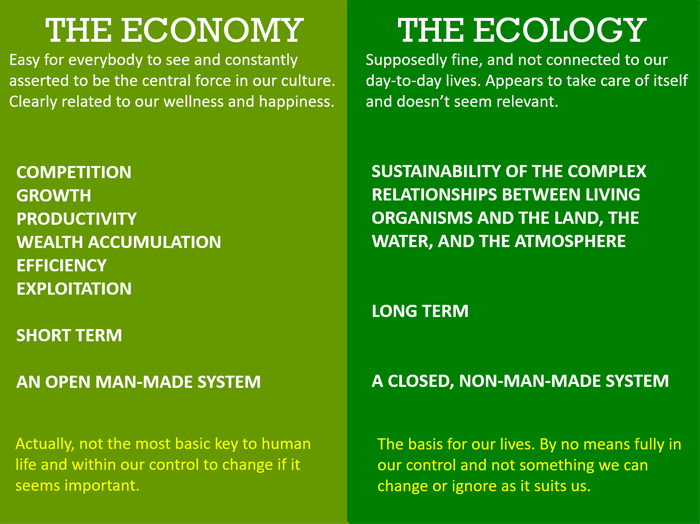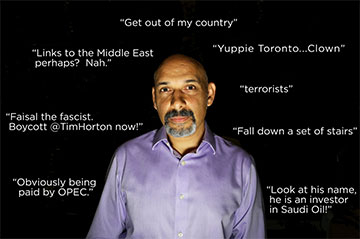It's Time for A new economic paradigm
Be sure you understand
- Ways we are blinded to the reality of nature
- Ways an ordinary person can fight climate change
- The current economic paradigm: neoliberal capitalism
- Biocentric vs Anthropocentric
- The two key flaws in the current economic paradigm according to Suzuki and Moola
The climate vs capitalism
We've looked briefly at the climate crisis, and this week we'll take a quick look at the current economic paradigm on which the most powerful nations today rely: neoliberal capitalism. One idea that has been emerging during the last couple of decades is the possibility that there is a fundamental conflict between the workings of the giant nature-made system of nature and the giant human-made system of globalized capitalist economics.
Many thinkers believe that we are not yet at a point where technology allows us to change nature to preserve the economic system (Nathan's Exemptionalist position), and therefore that the economic system will have to evolve to deal with the larger force of the system of nature (the Environmentalist position). In the short assigned reading for this week, David Suzuki and Faisal Moola attempt to put the incompatibility of the two systems (the economy and ecology) into the simplest terms possible.
Our general blindness to the reality of nature
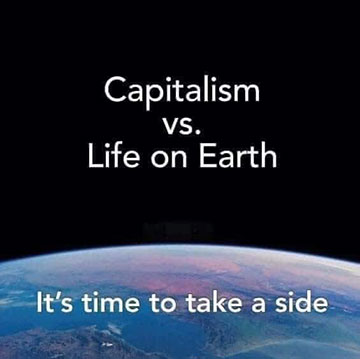
A popular meme right now.
Most of us city-dwellers in the Western world are almost wholly detached from that reality in our day to day existence. We may see ourselves as human beings, separate from and above nature.
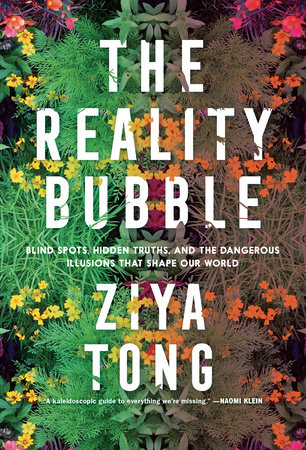
If you would like to disrupt this blindness, I can recommend an entertaining and eye-opening book by science broadcaster Ziya Tong, The Reality Bubble (2019). Tong's book is a science-based onslaught on how delusional many of our ways of perceiving reality have become. Those of us in the developed world live in cities; our food comes to us packaged and processed, our garbage magically disappears once a week, our shit goes down the drain and we never have to think about it again. And of course, we spend a huge amount of our attention on distracting media and the seemingly inescapable work and economy that our technology has created for us and that our institutions - including Humber College - largely insist are the central focus of human existence.
But in fact - and the pandemic has helped some of us to grasp this - we are animals: vulnerable, mortal, physical - desperately dependent on the rest of life on earth, on the oceans, on the weather and the oxygen we breathe, on fresh water, on microorganisms within us and in the environment that even scientists don't fully understand - and all this is mostly hidden from us by the lives we have chosen to lead (perhaps we have chosen this way of living so we can avoid as much as possible the reality of what we actually are). The COVID-19 pandemic has been a wake-up call about some of this. Our lives are at risk not because we don't have a good enough paying job but because we're animals, and an invisible microorganism can change everything. In an effort to avoid the loss of human life and the collapse of our man-made health care systems, the economy can be drastically slowed down, and we were forced to change our way of living because of this nasty little bug. I think there's a valuable lesson here about the basics of life, which privilged people in the wealthy nations of the world have largely been able to lose touch with.
Before the pandemic and continuing alongside it we have the climate crisis. Most people are now aware that this poses a huge threat to our way of life, if not to our whole species and certainly other forms of life on earth. We are not machines or computers; we are part of life, animals that are intimately connected to the rest of life on earth in a network of interdependent relationships. All our relations. Arguably this truth about us trumps invented human ideologies such as democracy, capitalism, technocracy, religions, and all the rest. The reading in the lesson for week 12 by David Suzuki and Faisal Moola comes from a biocentric perspective that suggest we need to see the rest of life on earth as our "family" with whom we have to live, not as something unlike ourselves that we can control and use as we see fit without any consequences.
Suzuki is a well-respected and influential Canadian environmentalist and broadcaster. He is probably best known for hosting the long-running CBC science series, The Nature of Things, which has been seen in more than 50 countries around the world. Suzuki is not an economist, but an ecologist. Still, in the brief article we will be looking at, he makes some simple observations that seem to strike at the fundamental assumptions of neoliberal economists. In the past, Suzuki has occasionally bluntly suggested that these economists are literally “insane.”
Perhaps we are not so much insane, as delusionally ignorant. To understand the reality of the world you have three basic tools: observation of your direct lived experience, the information and stories in the media, and science. Science extends what our senses can see and thinks hard about how to interpret that. But most people know and understand very little about science. Thus, we are mostly blind to realities that science can reveal, such as the dire state of our climate. We would rather consume fun media about pop stars, or binge-watch shows about improbable crime capers, and so forth.
What could you personally do to combat climate change
Assuming you take the threat of climate disaster seriously, what can we nobodies do to try to stop it?
The David Suzuki Foundation has posted a list of the top 10 things you could do. I'll focus here on three of the most important - and least appealing - steps you could take.
3. Green your commute and consume less
“In Canada, transportation accounts for 24 per cent of climate-polluting emissions, a close second to the oil and gas industry.”
- Take public transit
- Ride a bike or advocate for bike lanes in your community
- Car-share
- If you have a large, inefficient vehicle, retire it and switch to an electric or plug-in hybrid vehicle
Hyperconsumption is also a huge cause of greenhouse gas emissions. Green living is more imaginative and may even be more satisfying than hyperconsumption of unnecessary new consumer goods. Instead of consuming more products, consider other ways you might find happiness and meaning: “Focusing on life’s simple pleasures — spending time in nature, being with loved ones, making a difference to others — provides more purpose, belonging and happiness than buying and consuming.”
When you do want or need something, consider buying second hand, upcycling, making things yourself, repurposing something you already have, fixing something that is broken, sharing ownership and cost with someone else. All of these can actually be quite satisfying and are more creative and compassionate than endless selfish consuming of new junk. You will also save money. Fast fashion is out; thrift hauls are in.
2. Drastically reduce your consumption of "cheap meat"
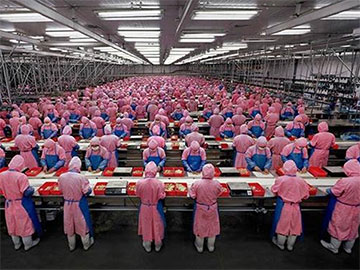
A chicken-processiong and -packaging plant in China. Sometimes chickens are shipped from Canada to China for cheaper processing and then shipped back to Canada or to other parts of the world.
The factory production of meat and dairy has a huge impact on greenhouse gas emissions. Cattle produce enormous amounts of methane; forests are destroyed to create grazing land, removing natural carbon sinks; and meat and dairy are processed and transported large distances in ways that add to the carbon footprint.
I am going to spend a little more time here on the "cheap meat" industry because it strikes me as a very clear example of humanity out of control - but out of sight from the average citizen. In the book The Reality Bubble that I mentioned above, Ziya Tong takes the reader through a dizzying and nauseating survey of how the meat industry works so that everyone in a wealthy country like Canada can have cheap meat at every meal if they want to. I'll leave it to you to decide whether you want to know about the horrors that the animals endure - most of us would rather not know - but even just the scale at which meat production happens worldwide is monstrous:
Today, there are over one billion domesticated pigs on Earth, one and a half billion domesticated cows, and, according to annual slaughter numbers by the UN’s Food and Agriculture Organization, almost sixty-six billion chickens. What this means, as George Musser, an editor at Scientific American, put it, is that “almost every vertebrate animal on earth is either a human or a farm animal.” Including horses, sheep, goats, and our pets, 65 percent of Earth’s biomass is domestic animals, 32 percent is human beings, and only 3 percent is animals living in the wild. (Tong 2019)
In other words, most of the animal weight on earth at present (97%) is human beings and the animals we have domesticated, mainly in order to eat them! This is one example of how radically humans have changed nature and diminished biodiversity.
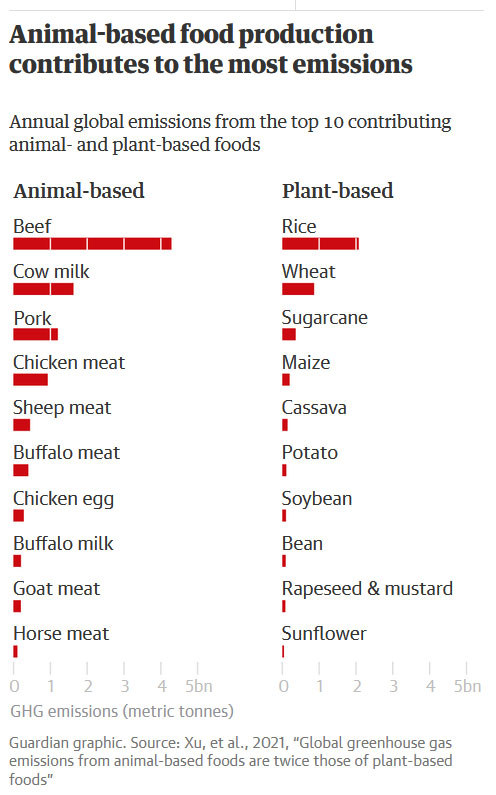
Source: Oliver Milman, "Meat accounts for nearly 60% of all greenhouse gases from food production, study finds," The Guardian Mon 13 Sep 2021.
A 2021 study publicized in The Guardian indicated that meat accounts for nearly 60% of all greenhouse gases from food production. Cattle release huge amounts of the greenhouse gas methane in their burps and farts, and the factories and transportation that make make meat comparatively cheap are large contributors to carbon release.
The entire system of food production, such as the use of farming machinery, spraying of fertilizer and transportation of products, causes 17.3bn metric tonnes of greenhouse gases a year, according to the research. This enormous release of gases that fuel the climate crisis is more than double the entire emissions of the US and represents 35% of all global emissions, researchers said.
“The emissions are at the higher end of what we expected, it was a little bit of a surprise,” said Atul Jain, a climate scientist at the University of Illinois and co-author of the paper, published in Nature Food. “This study shows the entire cycle of the food production system, and policymakers may want to use the results to think about how to control greenhouse gas emissions.”
The raising and culling of animals for food is far worse for the climate than growing and processing fruits and vegetables for people to eat, the research found, confirming previous findings on the outsized impact that meat production, particularly beef, has on the environment. (Oliver Milman, "Meat accounts for nearly 60% of all greenhouse gases from food production, study finds," The Guardian Mon 13 Sep 2021)
The desire to provide everyone on the planet with a steady diet of meat protein has led to grisly overexploitation of animals and a mammoth impact on the levels of greenhouse gasses. We now find both environmentalists and animal rights activists encouraging everyone to reduce our meat consumption, avoid "cheap meat" (processed and/or mass marketed meat, such as is used in fast food, frozen and canned food, and generally in supermarket meat) and cheap dairy (which is also an industry full of cruelty with a significant impact on carbon levels). The ideal, according to environmentalists, would be for us to embrace veganism, or hugely reduce our dairy consumption and eat meat at most once or twice a week.
- Eat less meat and dairy; go vegan when possible
- If you do eat meat or dairy, buy local, organic, naturally raised products whenever possible
- Don’t waste food; consume more carefully
- Grow your own (I've done it; it's fun and really makes you appreciate what goes into the food we eat)
1. Urge government to take bold, ambitious climate action now
Finally, and for most people probably even less attractive than the last two, you need to choose and influence leaders who take climate change seriously.
One often hears talk of a "Green Recovery." The recovery is from the COVID pandemic and its impact on our societies and economies. The idea is that since the government is going to have to spend a lot on economic recovery, we should be urging it to spend that money in the creation of green jobs and climate action, and definitely avoiding any further support for the fossil fuels industry. The Liberal government under Trudeau says it is concerned about the climate, but at the same time has put resources into pipelines. Many elements of the conservative governments in various provinces also want to double-down on fossil fuels for the sake of the economy. Environmentalists say we must start making the hard decisions right now to transition from these carbon-emitting industries, and that the government should focus its power and resources on working toward climate recovery in conjunction with economic recovery as we move (hopefully) out of the COVID crisis. Environmentalists consider the current government's plan to be nowhere near bold enough.
Only action by governments and corporations can ultimately save us. But changes we make in our personal lives and actions can help normalize sustainable practices, and there is some hope that these will "trickle up" to our leaders, if they see that we ordinary people really take them seriously.
The current economic paradigm: neoliberal capitalism
Capitalism is an economic worldview based on private ownership of the parts of society that produce and distribute goods (e.g. factories or supermarkets) and the operation of those private enterprises for profit. Characteristics central to capitalism include private property, capital accumulation (amassing wealth), wage labor, voluntary exchange in marketplaces, a price system, and competitive markets. In a capitalist market economy, decision-making and investment are determined by the owners or shareholders who control enterprises, by the people running the banks, and by the economists and brokers who manage capital markets (stocks and currencies), while prices and the distribution of goods are mainly determined by competition in the market.
We have not always lived as capitalists. Though trade has always been a part of more complex "civilized" human societies, capitalism as we know it is a relatively new model for the majority of humanity, and it came to prominence in the "Western world" during the same period that saw the rise in science and technology and the exploration and colonization of large parts of the rest of the world by Europeans (1500-1900). Capitalism became a common aspect of most Western people's lives after the Industrial Revolution (which took place around 1750 - 1900). Since the 1800s industrialized Western capitalism has been spreading around the rest of the world more virally.
In the second half of the 20th century the neoliberal version of capitalism became what most people in power in North America considered the norm, and was embraced by movers and shakers in other parts of the world as well. According to this version, capitalism should become the economic system of the whole planet - it will bring freedom, fairness, and prosperity with it. Globalization and free trade are good; everyone profits. The United States - the richest country in the world - is the model, the ideal. Every country in the world should try to follow the example of the United States: industrialization, wage labour, and trade across international borders. National governments should avoid regulating the marketplace; free trade on a global scale will lead to everyone enjoying the standard of living that people have in the United States, and similarly developed countries like Canada and most of Europe.
In the 1980s, three of the basic foundations of this neoliberal capitalist model were established: globalization (global free trade will profit everyone), "there is no alternative" (the idea that capitalism is the only viable economic system for human beings), and trickle-down economics (the idea that as the rich get richer, the wealth will naturally trickle down to everyone else as well).
The promise of capitalism seemed to be that every human being would eventually be able to live as well as the typical middle class American of the 1960s. That means they would have lots of private property, and could consume an endless range of products, and that everyone would just get richer as long as there was continued economic growth.
When I was a kid in California in the 1960s, this seemed perfectly plausible. Americans had never been more prosperous, especially middle class white Americans. My family was barely middle class, but we had a house, two cars, two tv sets and lots of new plastic toys at Christmas. It did indeed seem like things would just keep getting better.
Serious problems with globalization and the model of continuous economic growth
HUMAN RIGHTS
A serious part of the neoliberal system as it has played out in North America has been the "offshoring" of various kinds of labour to the developing world. On the one hand, this has meant cheaper labour costs for manufacturing and processing of goods, and this has kept the prices of consumer goods in North America down. But it comes with two kinds of human cost.
Workers in developing countries can be paid less than workers in North America and still enjoy better lifestyles than if they remained subsistence farmers in the countryside. But pay is low and working conditions are often gruelling and unsafe, and the work itself is often meaningless and alienated in the way Karl Marx suggested that all work under capitalism is. Most developing countries have less strict safety and health standards for workers than we have in Canada, and many of the people who produce our consumer goods are still living in what we would consider poverty.
Situations like the collapse of the sweatshop complex Rana Plaza in Bangladesh in 2013 are well known. This was a giant building that housed a number of clothing factories, producing clothes for – among others – Joe Fresh, Benetton, and Walmart. Though cracks had been noticed in the structure, there were not enough safety regulations in place, and it was left to collapse one day, killing 1130 people and leaving 2500 injured.
Because so many major companies have become multinationals, we have a situation now where a company headquartered in Canada can outsource various parts of the production process to parts of the world where labour is cheaper, usually partly because they don't have the workers rights legislation in place that we have in Canada. This makes you and I - whether we know it or not - complicit in sweatshop labour abroad, whose products we enjoy at more affordable prices without generally having to think about where they come from.
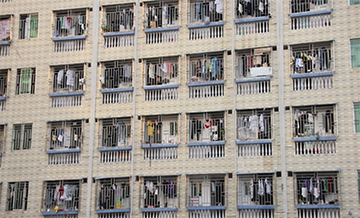
Foxconn dorms rendered suicide-proof by barring the windows.
The situation at the Foxconn industrial park in China in 2012 is often used to dramatize the plight of the overseas workers who produce our products. Foxconn workers were involved in the manufacture of BlackBerry, iPhones, PlayStation, Xbox, Kindle, Wii, and similar devices. The workers lived in dorms on site. They worked long hours doing often meticulous and stressful work, and then went back to their dorms for a meal, a couple of hours of tv, and sleep, to do it all again the next day. In 2010, following 14 suicide-related deaths, a report that involved research by universities in Hong Kong, Taiwan, and China described Foxconn factories as "labour camps" with widespread worker abuse. In 2012, 150 workers threatened to commit mass suicide to protest their working conditions. The workers were threatening to jump from the upper stories of their dorms. Rather than addressing their suffering, Foxconn's initial response was to install nets below, so that workers would not die if they jumped, or to put bars on the windows, so that they could not get out of the dorms to jump.
The complicity in worker suffering abroad is not the only problem that globalization has presented to Canadians. Part of the neoliberal rationale was that there would be a "trickle-down" effect in economics: as the rich got richer, the wealth would trickle down to enrich the rest of us as well. But in order to keep labour costs low, a lot of jobs that would have traditionally been available for Canadians have been offshored to developing countries. Many of the Canadian manufacturing jobs were unionized and well-paid with good benefits, and have now disappeared. Our consumer goods have remained cheap, even gotten cheaper, but our middle class has meanwhile also been shrinking for the last 40 years or so, and there seems to be a growing distance between the rich and the rest of us. The trickle-down effect has not apparently led to a growth in the middle and upper-middle class in North America. So critics argue that the wealth did not in fact trickle down - at least not to North Americans.
SHRINKING NEED FOR HUMAN LABOUR
Even if the criticisms I've looked at so far seem serious, one could hope the they are not part of the capitalist economic system inevitably, but problems that have arisen when people have pursued profit too single-mindedly at the expense of all other (humanitarian or moral) values. But now we're going to take a quick look at two more recent concerns about the sustainability of the capitalist model in the 21st century. These seem to be serious problems that capitalist proponents will have to face if the system is to remain or become something good for a majority of humanity.
A new 21st century concern people now have is whether the capitalist model will still work for the benefit of the majority with the advances in technology that are happening right now. With the growth in Artificlal Intelligence (AI) and robots, an already large "useless class" of people could become the majority of us, and traditional Industrial- and Post-Industrial-era jobs may not be available for most people. Automation and mechanization will extend beyond the check-out counter, into factories, distribution centres, transportation, and even care-giving centres like hospitals, schools, restaurants, and other traditional workplaces. There will be no need for human employees when AI, robots, and automated systems can do most of what humans do now for their jobs.
How will we support ourselves or who will support us if there are no jobs for most of us? We don't know right now. The influential historian and futurist Yuval Noah Harari, in 21 Lessons for the 21st Century, speculates that with the rise of Artificial Intelligence and robots, the mass of workers are destined to go from exploited to irrelevant, without any intermediary period in which all 8 billion of us have interesting creative jobs. Maybe we should be happy that robots can't quite yet act as priests, psychoanalysts, nurses, teachers, or even call centre staff. Once the machines can care better than we can, it's hard to see what labour any of us will be able to exchange for wages.
Wage labour is one of the building-blocks of capitalism, and one of the things that supposedly make it good for "the people." If there are fewer and fewer jobs that it makes sense to pay humans wages for, how can the model continue to operate? What will happen to us as our work becomes unnecessary for production and distribution - when robots build products, drones deliver them, and AI's provide our health care? Will we have to provide "entertainment" for the wealthy and hope they throw us some scraps? Will the government force redistribution of wealth and pay everyone a monthly salary just for existing? How will the model adapt to the vastly decreased need for wage labour that continued technological advances seem to be bringing?
ENVORNMENTAL UNSUSTAINABILITY
And, finally, we now have one more clear challenge to the capitalist model: the realities of our natural environment itself. This may be the thing that forces capitalism to evolve or die, or that forces us to invent a new system for the distribution of goods and services. This is the subject of the reading this week. The basic idea is this: neoliberal capitalism assumes that everyone's wealth will eventually increase as long as there is unhindered economic growth. But that is not feasible on a planet with a closed ecosystem, and as people get wealthier this in fact has so far led to more and accelerated destruction and degradation of the natural environment. The capitalist model is unrealistic as a system operating in the physical reality of our natural world, at least with a population of 8 billion human beings, all hoping to work and consume on the American model.
This brings us to the brief argument made by David Suzuki and Faisal Moola in this week's reading.
The need for a new economic paradigm
David Suzuki's co-author, UofT professor Faisal Moola, came in for racist attacks from pro-oil Twitter users in Alberta after he messaged Tim Hortons and thanked them for dropping ads by a company involved in pipeline projects.
The English word economy comes from Greek roots meaning "management of the household." When you think of the economy, it probably seems like it is all money, investments, standard of living, jobs, the "healthiness" and viability of corporations. But there are other factors to human health and well-being, indeed survival. Is capitalism still a viable model, or does the environmental crisis mean it has to go, or at least be seriously revised?
David Suzuki and Faisal Moola's brief statement of the matter is this week's assigned reading. You can read it on your own (it will take you 5-10 minutes!) or you can follow along with me here, to see what I make of it as I read it. Or both.
David Suzuki and Faisal Moola, "It's time for a new econmic paradigm," The Georgia Straight, August 18th, 2009.
I’ve heard economists boast that their discipline is based on a fundamental human impulse: selfishness. They claim that we act first out of self-interest. I can agree, depending on how we define self. To some, “self” extends beyond the individual person to include immediate family. Others might include community, an ecosystem, or all other species.
I list ecosystem and other species deliberately because we have become a narcissistic, self-indulgent species. We believe we are at the centre of the world, and everything around us is an “opportunity” or “resource” to exploit. Our needs or demands trump all other possibilities. This is an anthropocentric view of life.
Notice here the way Suzuki and Moola's attitude toward self parallels the indigenous worldview of "All my relations." The ideology of democracy+capitalism has generally seen the world as billions of competing individuals, each trying to get the best for themselves while largely ignoring the impact on others. This is only one way of seeing human beings (as selfish, competitive, and disconnected) and it is only one economic model that humans have lived by in the history of the world. Is it the last and best wisdom for how to live well, or is it more likely another false religion whose time has come?
Anthropocentric means "a way of looking at things where humans are at the centre of things, and the main thing you need to worry about is what humans say and do." As I said at the beginning of this lesson, many people are starting to see that our anthropocentric view of the world is a "reality bubble" that will eventually burst. It is foolish to think that what humans do on this planet is the only thing that matters, and that we are free to do anything because we are so powerful and smart. Elsewhere, Suzuki has characterized traditional and neoliberal market economists as "insane" in their tunnel vision, deeply detached from reality.
Thus, when faced with a choice of logging or conserving a forest, we focus on the potential economic benefits of logging or not logging. When the economy experiences a downturn, we demand that nature pay for it. We relax pollution standards, increase logging or fishing above sustainable levels, or (as the federal government has decreed [this was written in 2009]) lift the requirement of environmental assessments for new projects.
For a long time if economic growth and productivity (often assumed by ordinary people to translate into "jobs and prospertity") has come into conflict with environmental concerns, the econony "won." For example, the Trudeau government more recently gave a green light to the Trans Mountain pipeline in Alberta and B.C. despite the fact that science suggests we should leave any fossil fuels in the ground, not to mention the fact that there is quite a bit of resistance from indigenous groups, many of whose concern for their own land ties in with the broader interests of the environment in general. Trudeau promised that profits from the pipeline will be used to explore greener alternatives. When the government makes decisions like this, it is trying keep not just powerful corporations, but also voters happy. It is not thinking about protecting either the corporations or the voters from the consequences of their own short-sighted self-interest. It's easy for voters to understand their own economical predicaments, and hard for them even to be aware of how the environment works. Corporations are focused on their shareholders. Their concern is to maximize profits. Jobs and economic prosperity thus trump the realities of nature. And the politicians are often focused on their own selfish desire to maintain power. Thus, the environment seems secondary to all of them: voters, corporations, politicians.
Suzuki and Moola would call this attitude anthropocentric, as it treats reality as though the short-term success of particular human beings is the main thing, ignoring longterm sustainability, the people of the future, the rest of the people in the world right now, the rest of nature, and the future of the planet overall. Many now see this as a kind of blindness to reality at its most basic: the physical reality of the natural world that we are part of, and the reality of how life sustains itself in that world.
A fundamentally different perspective on our place in the world is called “biocentrism”. In this view, life’s diversity encompasses all and we humans are a part of it, ultimately deriving everything we need from it. Viewed this way, our well-being, indeed our survival, depends on the health and well-being of the natural world. I believe this view better reflects reality.
Here we see the question of "reality" again. For Suzuki and Moola, the abstract play of solely human economics are the shadows on the cave wall. The world outside the cave of capitalism is the more fundamental reality that we are first and foremost part of nature.
The most pernicious aspect of our anthropocentrism has been to elevate economics to the highest priority. We act as if the economy is some kind of natural force that we must all placate or serve in every way possible. But wait! Some things, like gravity, the speed of light, entropy, and the first and second laws of thermodynamics, are forces of nature. There’s nothing we can do about them except live within the boundaries they delimit.
But the economy, the market, currency – we created these entities, and if they don’t work, we should look beyond trying to get them back up and running the way they were. We should fix them or toss them out and replace them.
Some things are just real for Suzuki and Moola: laws of physics, for instance. Others are made up by humans - economics, for instance. Because humans invented the economy, we can change it, or toss the model out if it is coming into conflict with realities humans didn't invent and can't change. Ecology is the real "economy"; capitalist economics is an unreal way of managing the human household, which is still largely at the mercy of natural forces.
When economists and politicians met in Bretton Woods, Maine, in 1944, they faced a world where war had devastated countrysides, cities, and economies. So they tried to devise solutions. They pegged currency to the American greenback and looked to the (terrible) twins, the International Monetary Fund and the World Bank, to get economies going again.
Suzuki now talks about an economic summit held by the leaders of the capitalist world near the end of World War II, the Bretton Woods agerement. A new global monetary system was agreed upon, one that made the United States the standard for global currency and established America as the dominant power in the world economy.
The United States is one of the powers most committed to anthropocentric thinking about the economy. The thinking that all humans are selfish, each individual human is potentially against all others, and humans are the only thing we need to "deal with" to succeed are very common pre-assumptions of the form of liberal capitalist democracy that has now become the model of success to much of the rest of the world. (This really has only been the case for less than 100 years) By Suzuki's and Moola's reasoning, though, not every one of the eight billion people can become a well-to-do middle class American-style consumer. The things that make that impossible are not first and foremost laziness or lack of commitment; they are the limitations of the natural world, to endlessly provide for the greed of one species of primate.
The postwar era saw amazing recovery in Europe and Japan, as well as a roaring U.S. economy based on supplying a cornucopia of consumer goods. But the economic system we’ve created is fundamentally flawed because it is disconnected from the biosphere in which we live. We cannot afford to ignore these flaws any longer.
While acknowledging the success of America in the second half of the 20th century, Suzuki believes that the economic system that has been embraced by so much of the planet has two serious flaws, and that we are on the verge of discovering this the hard way if we aren't smart enough to recognize it intellectually.
Flaw 1: Beyond its obvious value as the source of raw materials like fish, lumber, and food, nature performs all kinds of “services” that allow us to survive and flourish. Nature creates topsoil, the thin skin that supports all agriculture. Nature removes carbon dioxide from the atmosphere and returns oxygen. Nature takes nitrogen from the air and fixes it to enrich soil. Nature filters water as it percolates through soil. Nature transforms sunlight into molecules that we need for energy in our bodies. Nature degrades the carcasses of dead plants and animals and disperses the atoms and molecules back into the biosphere. Nature pollinates flowering plants.
I could go on, but I think you catch my drift. We cannot duplicate what nature does around the clock, but we dismiss those services as “externalities” in our economy.
Free market capitalism ignores the parts of reality that seem to not be directly connected to its theory. The rest of nature is seen as an "externality" to the economy, and dismissed as irrelevant. Nature is seen by traditional capitalism the same way it sees everything - as a bunch of resources to be exploited for personal profit. If the environment is damaged or degraded by exploiting these resources, or simply can't keep up with the demand without collapsing, that is largely outside the scope of economics in the capitalist paradigm. But Suzuki and Moola think it will be disastrous to continue leaving the real "essential services" that nature provides out of our shared economic models, and we are already seeing some of the losses. These aren't financial losses; they're more fundamental than that. They're lives, and species, and ecosystems, including some of our own.
Flaw 2: To compound the problem, economists believe that because there are no limits to human creativity, there need be no limits to the economy. But the economy depends on having healthy people, and health depends on nature’s services, which are ignored in economic calculations. Our home is the biosphere, the thin layer of air, water, and land where all life exists. And that’s it; it can’t grow. We are witnessing the collision of the economic imperative to grow indefinitely with the finite services that nature performs. It’s time to get our perspective and priorities right. Biocentrism is a good place to start.
Biocentrism means considering life and the interconnectedness of all life first, before getting into what humans want and how they can get it. Free market capitalism demands unlimited growth if it is to work to everyone's advantage. Unlimited growth, forever. But there are actually very real limits to growth on our planet: natural ones. Natural resources are not infinite, new markets can't be manufactured out of thin air. Until we conquer space and perhaps colonize other planets where we can get new markets and resources and cheap labour, we are stuck in the limited space of the planet Earth, with its limited resources which are in a delicate balance that we rely on to be alive at all.
Ten years ago when the global economy was trying to recover from the 2008-9 scare, the buzzword was "economic growth." I don't know how many times I heard those words uttered with religious faith. But as a scientist, Suzuki believes that capitalist economics is a poor sort of science, because it is not holistic: endless economic growth is not sustainable within a limited natural world. The model may still work for some for a little while longer, but it is doomed to fail unless it can become more realistic about us being a part of nature, and nature having limits and not being irrelevant to our economy's continued success.
It’s time for a Bretton Woods II.
What Suzuki and Moola are saying in this final line is that there is an urgent need for the world governing agencies, including economists, to get together and come up with a more realistic and sustainable economic model than neoliberal capitalism. Any economic model that will actually be sustainable must move to a more biocentric view of reality. Obviously, it is not just the livelihood of Western capitalists that is at stake here - though ultimately they are at risk too - it is all human beings everywhere, and indeed many other forms of life.
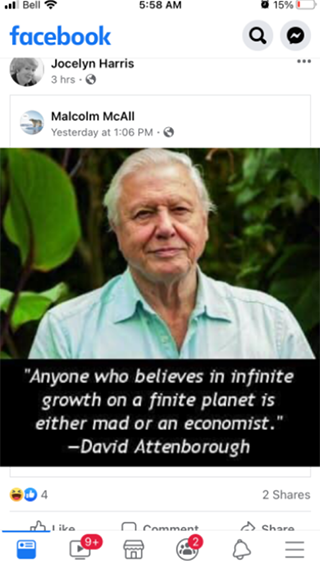
One of the things that is rather clever about Suzuki and Moola's brief newspaper editorial is that it is not making a sentimental appeal to save the polar bears. Rather, it is speaking in terms of economic logic - a language the capitalists can understand. They are saying that the current model is not economically sustainable, because it does not take into its calculations the reality of the ecosystem and the physical limits on growth. Economists and legislators must become more realistic and include environmental factors in all of their economic calculations. For all our sakes, but also for their own. Needless to say, though. the capitalist mentality is generally focused on the short term: what will be profitable for me, regardless of the impact on anyone else, in my lifetime.
We see small signs that there may be some movement by our leaders and even corporate heads in the direction of making capitalism more sustainable and ecologically less destructive, such as the (much hated) carbon tax initiative, the interest in factoring "ecological credits" into the traditional economic exchange, and in steps some corporations have tried to take to include the environment more in their calculations, both for the sake of the profit of their shareholders and for the sake of optics. Maybe even in some cases for the actual good of the environment, since some CEOs also enjoy golfing and sailing and such! ;-)
The American Dream that has turned into the Global Ideal is that every human being can live like a king, and have more and more all the time. We are already seeing ways in which that might simply not be true. In America the rich have been getting richer and the poor have been getting poorer since the 1980s (in the postwar boom between 1945 and 1980 it did indeed look like everyone was going to keep getting richer, but that hasn't actually happened.) Very few people will be able to live like a king if the environment goes to hell. It will be a struggle for survival and a sad time for life on earth and a setback (at least!) for humanity in the slow crawl toward global and multicultural cooperation that we have made so far. With my limited knowledge of both economics and natural science, I am inclined to accept Suzuki and Moola's argument. I find many aspects of hyperexploitative and hyperconsumerist capitalism unattractive anyway; but the ecological argument seems to be one that goes beyond what we find appealing or not. The ecological argument is in a sense an "economic one": it's about how nature also implies an economy of costs, exchange, profits, and deficits. The reality of nature seems like a real showstopper to capitalism as a system for all, if it can't drastically evolve. We need a new economic paradigm.
